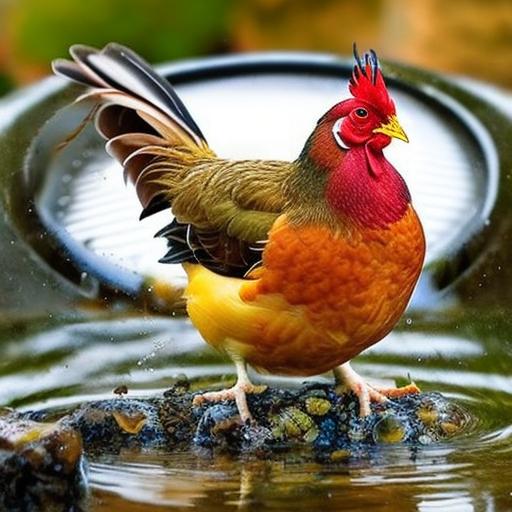Water is a vital resource for chickens, and ensuring they have access to clean and fresh water is crucial for their health and well-being. However, providing water for chickens during the winter months can be challenging. Freezing temperatures can cause water to freeze, making it inaccessible to the birds. In this article, we will discuss the importance of accessible water for chickens during winter and explore various strategies to overcome the challenges of providing water in cold weather.
Key Takeaways
- Accessible water is crucial for chickens during winter to prevent dehydration and other health issues.
- Frozen water can pose serious risks to your flock, including dehydration and frostbite.
- Choosing the right watering system for cold weather is important to ensure your chickens have access to unfrozen water.
- Preparing your coop for winter watering involves insulating waterers and monitoring water temperature.
- Heated waterers, adding salt or sugar to water, changing water frequently, and monitoring water temperature are all effective ways to prevent freezing and keep chickens hydrated.
The Importance of Accessible Water for Chickens During Winter
Water is essential for chickens all year round, but it becomes even more critical during the winter months. Chickens need water to stay hydrated, regulate their body temperature, aid in digestion, and maintain overall health. Without access to water, chickens can quickly become dehydrated, leading to a range of health problems.
Dehydration can cause decreased egg production, poor egg quality, reduced feed intake, weight loss, and even death in severe cases. Additionally, chickens rely on water to help them stay warm during cold weather. They drink water and then fluff up their feathers to create an insulating layer of air that helps keep them warm. Without access to water, chickens may struggle to regulate their body temperature and be more susceptible to cold stress.
Understanding the Risks of Frozen Water for Your Flock
Frozen water is a significant problem for chickens during winter. When water freezes, it becomes inaccessible to the birds, leaving them without a vital resource. Chickens cannot break through ice to access the water beneath it, so it is crucial to prevent water from freezing in the first place.
In addition to the challenge of accessing frozen water, there are also health risks associated with lack of water. Dehydration can occur quickly in chickens, especially in cold weather when they need more water to stay hydrated and regulate their body temperature. Dehydration can lead to reduced egg production, poor egg quality, weight loss, and even death.
Choosing the Right Watering System for Cold Weather
| Watering System | Pros | Cons |
|---|---|---|
| Drip Irrigation | Conserves water, reduces weed growth, delivers water directly to plant roots | Requires installation, can be expensive, may clog with sediment |
| Sprinkler System | Covers large areas, easy to install, can be adjusted for different plant types | Can waste water, may not deliver water directly to plant roots, can be affected by wind and cold temperatures |
| Soaker Hose | Conserves water, delivers water directly to plant roots, easy to install | May not cover large areas, can be affected by cold temperatures, may require frequent replacement |
| Hand Watering | Allows for precise watering, can be done at any time, no installation required | Can be time-consuming, may not cover large areas, can be affected by cold temperatures |
To ensure your chickens have access to water during winter, it is essential to choose the right watering system. There are several options available, each with its pros and cons.
1. Traditional Waterers: Traditional waterers are the most common type of watering system for chickens. They consist of a container that holds water and a tray or trough where the birds can drink from. While traditional waterers are affordable and easy to use, they are prone to freezing in cold weather.
2. Heated Waterers: Heated waterers are specifically designed to prevent water from freezing. These waterers have built-in heating elements that keep the water at a temperature above freezing. While heated waterers are effective, they can be more expensive than traditional waterers and require access to electricity.
3. Nipple Waterers: Nipple waterers are a popular choice for backyard chicken keepers. They consist of a series of small nipples that release water when the chickens peck at them. Nipple waterers are less likely to freeze compared to traditional waterers, but they can be more challenging for chickens to learn how to use.
Preparing Your Coop for Winter Watering
Before winter arrives, it is essential to prepare your coop for winter watering. This involves making sure your coop is well-insulated and protected from drafts. Insulating your coop will help retain heat and prevent freezing temperatures from affecting the water supply.
Start by checking for any gaps or cracks in the walls or windows of your coop and seal them with caulk or weatherstripping. Insulate the walls and ceiling with insulation material such as foam boards or fiberglass insulation. Pay special attention to areas where cold air can enter, such as vents or openings for electrical cords.
Additionally, make sure your coop is well-ventilated to prevent moisture buildup, which can lead to frostbite and other health problems. Install vents or windows that can be opened and closed to regulate airflow. Proper ventilation will help maintain a dry and comfortable environment for your chickens.
Insulating Your Waterer to Keep it from Freezing

Insulating your waterer is another effective way to prevent freezing. By adding insulation around the water container, you can help retain heat and keep the water from freezing.
One option is to use an insulated waterer cover or jacket. These covers are designed to fit over the water container and provide an extra layer of insulation. They are typically made of foam or other insulating materials and can help keep the water from freezing for longer periods.
Another option is to wrap the water container with insulation material such as bubble wrap or foam pipe insulation. Start by wrapping the container with a layer of bubble wrap, securing it with tape or zip ties. Then, wrap the container with foam pipe insulation, making sure to cover all sides. This additional layer of insulation will help keep the water from freezing.
Using Heated Waterers to Keep Water Flowing
Heated waterers are an excellent solution for keeping water flowing during winter. These waterers have built-in heating elements that prevent the water from freezing, ensuring your chickens have access to clean and fresh water at all times.
When choosing a heated waterer, consider the size of your flock and the amount of space available in your coop. There are various types of heated waterers available, including heated bowls, heated bases, and heated nipple systems. Choose a model that suits your needs and budget.
To use a heated waterer, simply plug it into an electrical outlet and fill it with water. The heating element will keep the water at a temperature above freezing, preventing ice from forming. Make sure to check the water level regularly and refill as needed.
Adding Salt or Sugar to Water to Prevent Freezing
Another method to prevent water from freezing is to add salt or sugar to the water. Both salt and sugar lower the freezing point of water, making it less likely to freeze in cold temperatures.
To use this method, dissolve a small amount of salt or sugar in the water. Start with a teaspoon of salt or sugar per gallon of water and adjust as needed. Stir the mixture until the salt or sugar is completely dissolved.
It is important to note that while adding salt or sugar can help prevent freezing, it can also affect the taste of the water. Some chickens may be reluctant to drink water with added salt or sugar, so monitor their water intake and adjust the amount accordingly.
Changing Water More Frequently in Cold Weather
In cold weather, it is crucial to change the water more frequently to prevent it from freezing. By regularly replacing the water, you ensure that your chickens always have access to clean and unfrozen water.
Check the water supply multiple times a day and refill as needed. If you notice any ice forming, remove it immediately and replace it with fresh water. It is better to provide smaller amounts of water more frequently than to let it freeze and become inaccessible to your chickens.
Monitoring Water Temperature to Ensure Chickens Stay Hydrated
Monitoring the water temperature is essential to ensure your chickens stay hydrated during winter. Cold temperatures can cause the water to cool down quickly, making it less appealing for chickens to drink.
Invest in a thermometer specifically designed for measuring water temperature. Place the thermometer in the water container and check it regularly. The ideal water temperature for chickens is between 45-65 degrees Fahrenheit (7-18 degrees Celsius). If the water temperature drops below this range, consider using a heated waterer or adding insulation to keep the water warmer.
Tips for Dealing with Frozen Water in Emergency Situations
Despite your best efforts, there may be situations where your waterer freezes unexpectedly. In these emergency situations, there are a few steps you can take to ensure your chickens have access to water.
First, remove the frozen water container and replace it with a fresh one. Bring the frozen container indoors and thaw it by placing it in a warm room or using warm water. Once the ice has melted, refill the container with fresh water and return it to the coop.
If you do not have a spare water container, you can use temporary solutions such as providing warm water in shallow dishes or using heated bowls. These temporary measures will provide your chickens with some water until you can resolve the issue with the frozen waterer.
Providing accessible water for chickens during winter is crucial for their health and well-being. Dehydration and other health problems can arise from lack of water, especially in cold weather when chickens need more water to stay hydrated and regulate their body temperature.
To ensure your chickens have access to water during winter, choose the right watering system for cold weather, prepare your coop for winter watering, insulate your waterer, use heated waterers if necessary, add salt or sugar to prevent freezing, change water more frequently, monitor water temperature, and be prepared for emergency situations.
By taking these steps, you can ensure that your chickens stay hydrated and healthy throughout the winter months. Remember, providing accessible water is just as important as providing food and shelter for your flock.
If you’re looking for ways to keep your chickens’ water from freezing during the winter months, check out this helpful article on how to insulate a chicken coop. It provides valuable tips and techniques to ensure that your chickens have access to unfrozen water even in the coldest temperatures. Don’t let freezing water be a problem for your flock – learn how to keep it from freezing with these practical suggestions.
FAQs
What causes chicken water to freeze?
The main cause of chicken water freezing is the low temperature during winter. When the temperature drops below freezing point, the water in the chicken’s waterer freezes.
Why is it important to keep chicken water from freezing?
It is important to keep chicken water from freezing because chickens need access to clean water at all times. If their water freezes, they may become dehydrated, which can lead to health problems and even death.
What are some ways to keep chicken water from freezing?
Some ways to keep chicken water from freezing include using heated waterers, adding insulation to the waterer, using a heated base, and using a water heater.
What is a heated waterer?
A heated waterer is a type of waterer that has a built-in heating element that keeps the water from freezing. It is designed to be used during the winter months when temperatures are low.
What is a heated base?
A heated base is a device that is placed under the chicken waterer to keep the water from freezing. It is designed to be used with metal or plastic waterers and can be plugged into an electrical outlet.
What is a water heater?
A water heater is a device that is used to heat water. It can be used to keep chicken water from freezing by heating the water in the waterer. Water heaters can be electric or gas-powered and come in different sizes and capacities.
Meet Walter, the feathered-friend fanatic of Florida! Nestled in the sunshine state, Walter struts through life with his feathered companions, clucking his way to happiness. With a coop that’s fancier than a five-star hotel, he’s the Don Juan of the chicken world. When he’s not teaching his hens to do the cha-cha, you’ll find him in a heated debate with his prized rooster, Sir Clucks-a-Lot. Walter’s poultry passion is no yolk; he’s the sunny-side-up guy you never knew you needed in your flock of friends!







